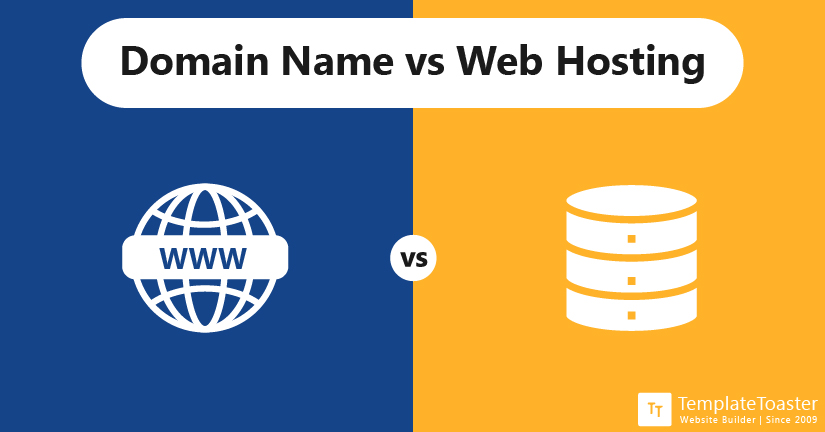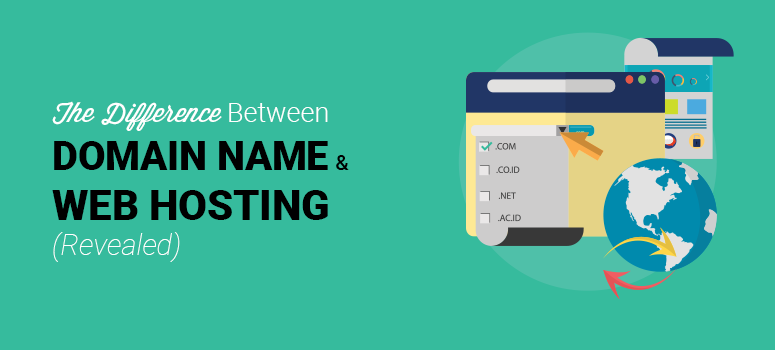Web hosting and domain names are fundamental for websites. They are like the home and address of your online presence.
Understanding these concepts is crucial for anyone looking to create a website. Web hosting provides the space where your website’s files reside. A domain is the unique name that users type to access your site. Together, they enable your website to be accessible on the internet.
In this blog post, we will explore what web hosting and domain names are. We will also discuss how they work together. This knowledge will help you make informed decisions when setting up your website. Whether you’re a beginner or looking to brush up on the basics, this guide will be helpful.

Credit: blog.templatetoaster.com
Introduction To Web Hosting
Starting a website can be confusing for beginners. One of the first steps is understanding web hosting. It’s a service that allows you to post a website or web page on the Internet. This section will explain the basics of web hosting and why it is crucial for your online presence.
What Is Web Hosting?
Web hosting is a service provided by hosting companies. They store your website files on their servers. When users want to view your site, they type your domain name into their browser. Their computer then connects to the server where your website is hosted. The server sends the files to the users’ browsers, and your website appears.
Importance Of Web Hosting
Good web hosting is essential for several reasons:
- Website Performance: Quality hosting improves load times and overall site performance.
- Uptime: Reliable hosting ensures your site is available 24/7.
- Security: Hosting providers offer security features to protect your site from threats.
- Technical Support: They provide support to solve technical issues quickly.
Choosing the right web hosting service is crucial. It impacts your website’s speed, security, and reliability. Take the time to research and select a provider that meets your needs.
Types Of Web Hosting
Web hosting is crucial for your website’s success. Different types of web hosting cater to different needs. Choosing the right type ensures optimal performance and cost-efficiency. Let’s explore the various types of web hosting available.
Shared Hosting
Shared hosting is cost-effective and suitable for beginners. Multiple websites share one server’s resources. This keeps costs low but can affect performance. It’s ideal for small websites with low traffic.
Vps Hosting
VPS stands for Virtual Private Server. It offers more control and resources than shared hosting. Websites share a physical server but have dedicated resources. It’s suitable for growing websites needing better performance.
Dedicated Hosting
Dedicated hosting means your website has an entire server to itself. This provides maximum control and performance. It’s perfect for large websites with high traffic. It’s more expensive but offers greater reliability and security.
Cloud Hosting
Cloud hosting uses multiple servers to host websites. This offers flexibility and scalability. Resources can be adjusted based on your website’s needs. It’s great for websites with fluctuating traffic.
Choosing The Right Hosting Plan
Choosing the right hosting plan is crucial for your website’s success. The right plan ensures your site runs smoothly and meets your needs. Let’s explore how to make the best choice.
Assessing Your Needs
First, determine what your website requires. Different websites need different resources.
- Personal Blog: Basic hosting with a small amount of storage and bandwidth.
- Small Business: Needs more storage, bandwidth, and security features.
- E-commerce Site: Requires high security, large storage, and excellent uptime.
Budget Considerations
Your budget will impact your hosting choice. It’s important to balance cost and features.
| Type | Cost (per month) | Features |
|---|---|---|
| Shared Hosting | $3 – $10 | Basic resources, suitable for small sites |
| VPS Hosting | $20 – $60 | More resources, better performance |
| Dedicated Hosting | $80 – $300 | High resources, top performance |
Scalability
Scalability is vital for growing websites. Your hosting plan should grow with your site.
- Start Small: Begin with a basic plan.
- Upgrade as Needed: Move to higher plans as your site grows.
- Monitor Performance: Regularly check if your hosting meets your needs.
Choosing the right hosting plan can seem daunting. But by assessing your needs, considering your budget, and planning for scalability, you can make a wise choice.

Credit: www.isitwp.com
Introduction To Domains
Understanding web hosting and domain names is essential for creating a website. These two elements form the foundation of your online presence. Let’s dive into the basics of domains.
What Is A Domain?
A domain is your website’s address on the internet. It is what users type in their browser to visit your site. A domain consists of two main parts: the name and the extension.
The name is the unique part of the address, like “example” in “example.com”. The extension is the suffix, such as “.com”, “.org”, or “.net”. These extensions indicate the type of organization or purpose of the website.
How Domains Work
Domains work through a system called DNS, or Domain Name System. The DNS translates the domain name into an IP address. Computers use IP addresses to communicate with each other.
When you type a domain in your browser, the DNS finds the correct IP address. It then connects you to the website’s server, allowing you to view the site. This process happens in milliseconds, making it seem instant to users.
Registering a domain is the first step in creating a website. You can register a domain through a domain registrar. Make sure your domain name is unique and relevant to your site.
Types Of Domain Extensions
Understanding the types of domain extensions is crucial for choosing the right one. These extensions help define the nature of your website. Let’s explore some common types and their uses.
.com
The .com domain is the most popular extension. It stands for “commercial.” Many businesses prefer .com for its credibility. It’s easy to remember and widely recognized.
.net
The .net extension stands for “network.” It’s often used by tech companies. Internet service providers also favor .net. It’s a reliable choice if .com is unavailable.
.org
The .org extension means “organization.” Non-profits and charities usually choose .org. It signifies trust and integrity. Many educational institutions use .org too.
Country-specific Extensions
Country-specific extensions represent different countries. For example, .us for the USA or .uk for the UK. These are great for local businesses. They help target a specific audience within a country.

Credit: www.youtube.com
Registering A Domain
Registering a domain is the first step to getting your website online. A domain is your web address, like example.com. It is how people find your site on the internet. This section covers how to choose a domain name and the domain registration process.
Choosing A Domain Name
Choosing a domain name is important. It represents your brand or idea. Here are some tips to help you:
- Make it short and easy to remember.
- Avoid using numbers and hyphens.
- Ensure it is relevant to your content.
- Check if the name is available.
Domain Registration Process
Registering a domain involves a few simple steps. Here’s a table to guide you:
| Step | Description |
|---|---|
| Search for Availability | Use a domain registrar to check if your desired name is available. |
| Select a Registrar | Choose a reputable domain registrar to register your domain. |
| Choose a Domain Extension | Select an extension like .com, .net, or .org. |
| Provide Contact Information | Enter your personal or business details. |
| Complete Payment | Pay for your domain. Many registrars offer annual plans. |
After completing these steps, your domain will be registered. You can then connect it to your website.
Connecting Domain And Hosting
Connecting your domain to your web hosting is a crucial step. This process ensures that visitors can access your website easily. Here, we will guide you through the steps. We will cover DNS settings and how to point your domain to your hosting.
Dns Settings
DNS stands for Domain Name System. It translates your domain name into an IP address. This is how web browsers find your website. To connect your domain and hosting, you need to adjust your DNS settings. Log into your domain registrar’s account. Find the DNS settings section. Here, you will add the IP address provided by your hosting service.
Pointing Domain To Hosting
Once you have the DNS settings ready, the next step is pointing your domain to your hosting. This tells the internet where to find your website. In your domain registrar’s dashboard, look for the section to manage DNS records. You will need to add an “A record”. This record points your domain to the IP address of your web hosting server.
After you have entered the IP address, save the changes. It may take a few hours for the changes to update. Once complete, your domain will lead visitors to your website. Checking your website will confirm the connection. If you see your web pages, the setup is successful.
Maintaining Your Website
Maintaining your website is crucial for ensuring it runs smoothly. Regular upkeep prevents technical issues and security vulnerabilities. This section will cover three essential aspects: regular backups, security measures, and performance optimization.
Regular Backups
Regular backups are vital for safeguarding your data. These backups can save you from data loss due to hacks or server failures. Most hosting providers offer automated backup solutions. You can also use plugins to schedule backups. Here are some key points:
- Automate backups to avoid manual errors.
- Store backups in multiple locations, including cloud storage.
- Test your backups to ensure they can be restored.
Security Measures
Implementing robust security measures protects your website from threats. Here are some essential actions:
- Use strong, unique passwords for all accounts.
- Enable two-factor authentication (2FA) where possible.
- Regularly update your software, themes, and plugins.
Installing a security plugin can also help. It can monitor your site for suspicious activity and alert you to potential issues. Consider the following:
- Firewall protection to block malicious traffic.
- Malware scanning and removal tools.
- Regular security audits to identify vulnerabilities.
Performance Optimization
Optimizing your website’s performance improves user experience and search engine rankings. Here are some strategies:
- Use a Content Delivery Network (CDN) to speed up load times.
- Optimize images and other media files to reduce their size.
- Minimize the use of heavy plugins and scripts.
Regularly monitor your website’s performance using tools like Google PageSpeed Insights. Focus on the following areas:
- Reduce server response times.
- Enable browser caching for faster repeat visits.
- Compress files to speed up loading.
Frequently Asked Questions
What Is Web Hosting?
Web hosting is a service that allows organizations and individuals to post a website or web page onto the Internet.
What Is A Domain Name?
A domain name is the address where Internet users can access your website. It is unique for each website.
How Does Web Hosting Work?
Web hosting works by storing your website files on a server, which is connected to the Internet.
Why Do I Need Web Hosting?
You need web hosting to make your website accessible on the Internet. Without it, your website won’t be visible.
Conclusion
Understanding web hosting and domains is crucial for your online presence. Web hosting stores your site’s data. Domains act as your website’s address. Both are essential for a functional website. Choose reliable hosting for better performance. Pick a memorable domain name.
Start building your website today. It’s simpler than it sounds. Follow these basics, and you’ll be online in no time. Happy building!